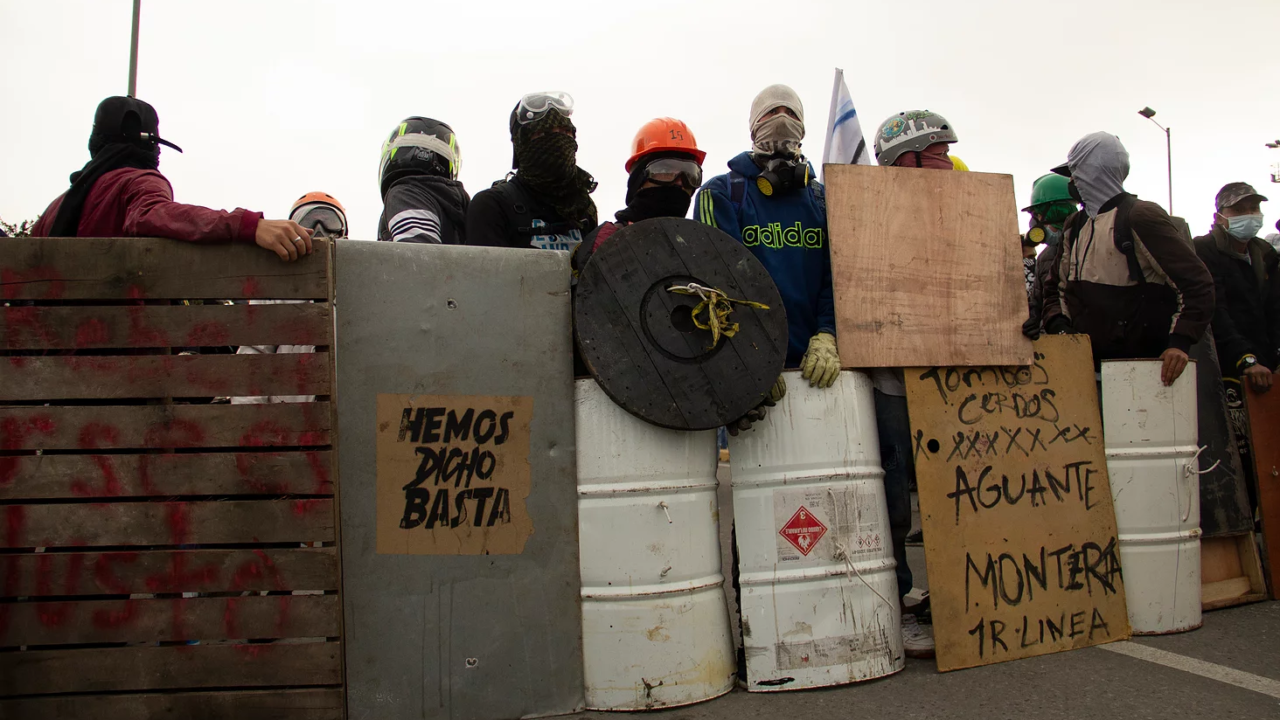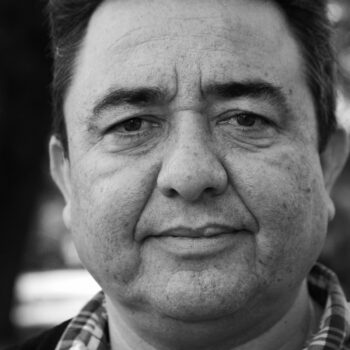Colombia’s President Iván Duque came to power two years ago on a neoliberal, pro-business agenda, promising more jobs and less taxes. His decision to break that promise two weeks ago couldn’t have come at a worse time: in the middle of a mortal pandemic that has hit Colombia harder than virtually any other country in the region. Duque proposed raising the sales tax, a form of taxation that most negatively impacts those with the least money to spend. The tax reforms are part of a broader “paquetazo neoliberal,” or “neoliberal package,” which also includes changes to the pension system, the healthcare system, and the labor code, all of which, if implemented, would put a greater squeeze on struggling Colombians.
The people’s response to the “tax reform” was massive and decisive. A coalition of unions and civic organizations called for a national strike on Wednesday, April 28, and hundreds of thousands of people from across Colombia poured into the streets. By Sunday, truck drivers had joined the strike, a move that forced Duque to withdraw the tax, and the Minister of Finance who authored it resigned. The government’s reversal was a victory for Colombians, but the strike continues. In response, the government has deployed the national police, the army, riot cops, and vigilantes, aiming to stop the mobilizations by brutalizing the population. Multiple videos show uniformed and non-uniformed police utilizing live ammunition against protesters in broad daylight. Cali has been the epicenter of the discontent, and the city that has borne the brunt of the government’s military response.
An independent human rights report indicates that, two weeks into the strike, there were 362 victims of physical violence by police, 39 people killed by the state, 1,055 arbitrary detentions, thirty victims of ocular trauma, 133 cases of shotings, and 16 victims of sexual violence. This is only a preliminary report, which does not take into account the more than one hundred people who are reported missing.
Diego Catatumbo, a law student living on the Colombian Caribbean Coast, is part of an organization called Defendamos la Paz, Let’s Defend the Peace, dedicated to implementing the 2016 peace agreements that ended more than sixty years of internal armed conflict. Today, many Colombians fear that the heavy handed tactics being utilized against protesters are meant to provoke violent responses that could derail the peace process and return the country to an open armed conflict. On May 5, I talked with Catatumbo about the austerity measures causing the protests, the government’s violent crackdown, and why the strike continues despite severe repression.
Editor’s note: For security reasons, the interviewee asked to be identified through a pseudonym. This interview has been edited and condensed.
Tell us about the situation in Colombia right now.
I’m going to give you a historical analogy. On July 20, 1810, here in Colombia, people wanted to hold an Open Town Hall in the central square of Bogotá. They wanted to put a flower vase on the main table where people would gather. Since they didn’t have a flower vase, they went to a Spaniard named Llorente so that he could lend them a flower vase. They knew that the Spaniard was Realist [against independence]. Llorente didn’t lend them the flower vase, so the patriots grabbed it and smashed it on the floor. The breaking of that flower vase is said to have been the cause of the rebellion that led to Colombia’s independence.
The flower vase was the excuse, not the real cause. The sales tax situation could be seen like that. There are a lot of grievances.
But increasing the sales tax in the middle of a pandemic seems like a big one.
For sure. A few days ago, the Minister of Finance, Alberto Carrasquillas [Barrera], had an interview with Viky Davila announcing an increase in the sales tax and saying that it was not going to be so big, that he didn’t understand why people were complaining. Then the two started joking about the fact that neither of [them] do their own grocery shopping. So then they start talking about prices and one says that a dozen eggs costs fifty cents, when in reality a dozen eggs costs more than two dollars — four times what they think. They don’t know what life costs in Colombia.
People were outraged by that comment and began to call for the April 28 mobilization, the national strike to stop the tax reform. And so it began. But it must be said that tax reform is not the only thing bothering the Colombian people. These feelings have been going on for years, but at this particular juncture, [the anger] is against the entire neoliberal package that the government intends to pass.
The government says it needs money to pay the costs of the pandemic.
At this time, Colombia owes 63 percent of its GDP to international debt with the World Bank and the International Monetary Fund. It has to pay because if the risk agencies rate Colombia badly, the entire speculative process begins, then international investment is deemed risky, with all that implies for the rich and the super rich.
The issue is that this tax reform is accompanied by a pension reform, a labor reform, and a health reform. Today, if a person dies and there are funds left behind in the AFP [Private Pension Administrators], the rest of that pension goes to the surviving spouse or a child. Now, if the person dies, they want that money to be kept by the AFPs.
Health care is completely privatized here. Everyone has to pay out of pocket on a sliding scale. There is no free health care anywhere, at any level. With health care reform now, if you go to the doctor and the doctor who treats you tells you that you are sick because of your lack of care, they want to charge you more for not taking care of yourself. The [public] Cancer Hospital is going to disappear and there will only be [private] cancer clinics. No one is going to be treated for cancer [who cannot afford private care].
With labor reform, the employment contract is going to end; everyone is going to be a contractor paid hourly: bonuses, vacations, pension, all that is going to go to hell.
These are the austerity reforms that the IMF wants to impose. To be able to pay the debt, [the Duque government] wants to pick the pockets of Colombians.
You won an important victory: no more tax and no more finance minister.
The finance minister had to resign, but another neoliberal was brought in. Let everyone go so that everything remains the same. But the truth is that it was a [small] triumph because it showed people that it is worth mobilizing, that it is worth fighting.
What do you think will be the outcome now that the tax has been lowered? Does the movement keep going?
It is not clear how this ends. There continue to be rumors that the government will declare a State of Internal Commotion, and with that, they’re going to finish militarizing all the cities. There is a lot of fear that there will be multiple massacres in different parts of the country.
In addition, there is plenty of evidence that the police [have] infiltrated the movement: they are disguising themselves as peasants. There was information that a good number of policemen went to buy overalls on the outskirts of Bogotá to pretend they’re fighting the cops. Other policemen bought marbles, which can be used as lethal projectiles; since they are not official ammunition, they can later claim that the protetester are killing each other.
Tell us about the violence protesters have had to endure.
The response from the government has been vindictive. It has militarized the cities. Cali was the city that mobilized the most, and they have been massacring them since the first weekend, with more than 280 soldiers [deployed] last night. Today, in the morning, new military aircraft continued to arrive in Cali. Commercial airplanes do not enter or leave Cali; the city is surrounded. Last night they massacred 22 people, in official figures, so it is possible that they have murdered more than one hundred. Just yesterday, they disappeared 12 [people]; Colombia has 60,000 missing people.
There is a serious human rights crisis. Everything that they accused Venezuela of doing but never had evidence of, now there is evidence that the Colombian government is doing it, at close range, indiscriminately, viciously, cruelly. But the strike continues.
How have the 2016 Peace Accords between the government and guerrilla forces impacted this moment?
In 2016, a peace agreement was signed between the government and the Fuerzas Armadas Revolucionarias de Colombia, FARC, the largest guerrilla force in the country. With the peace [deal], the big lie that the country’s problems were because of the guerrillas collapsed. The problems continued and got worse without guerrillas. Then people realized that the problem was not the guerrillas. There are problems because we have a political and oligarchic caste that continues to bleed the country. Before, people did not go out to protest for fear of being called “guerrilla fighters” and getting killed. Now, since there are no guerrillas, people go out to protest without fear, with their outrage.

